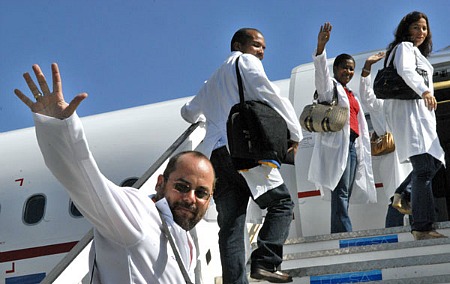 After Decree-Law No. 302 went into force on January 14, health professionals in Cuba could now travel, at least in theory. However, in order to practice in the medical profession in other parts of the world one needs, logically, to be legally licensed in Cuba, in order to be recognized abroad, later. But the cost of this license, from Cuba’s Ministry of Foreign Affairs Legal Department, is $1,200 (U.S.), and the average monthly salary of a doctor in Cuba is 573 Cuban pesos, equivalent to about $25.
After Decree-Law No. 302 went into force on January 14, health professionals in Cuba could now travel, at least in theory. However, in order to practice in the medical profession in other parts of the world one needs, logically, to be legally licensed in Cuba, in order to be recognized abroad, later. But the cost of this license, from Cuba’s Ministry of Foreign Affairs Legal Department, is $1,200 (U.S.), and the average monthly salary of a doctor in Cuba is 573 Cuban pesos, equivalent to about $25.
Tomas Rodriguez, a 43-year-old physician, has been invited by a friend to live and work in a foreign country. Tomas does not have his own home in Cuba, after 18 years of working in his profession. One of the expectations he had with this trip is that some day, if he decides to return, he can buy a house.
“I’m on the verge of despair. My friend is going to take care of my travel expenses and, at first, to give me housing. But this assumes that I should bring the title to practice my profession,” says Tomas.
The money required has the character of a “Tax.” The application for “Certification” costs 250 convertible pesos or cuc (more than $250 U.S.), and its legalization is 200 cuc. The request for your school records costs 350 cuc, and legal endorsement another 200 cuc. The General Medical degree can be had for just 200 cuc, because the person brings the document themselves and only needs to pay to have it legally endorsed, which costs the same for all documents. This is also true for other degrees from different specialties studied.
If Tomas comes to legalize the General Medical degree, he would prefer to renounce the other two specialties he has: “This opportunity isn’t going to last forever. Fortunately, they give you the degrees when you graduate. If I ask for a notarized school record for another purpose, they give it to me with a footnote that says it can only be used in the national territory,” he explains.
And he adds, “At least now we are free (in theory) to enter and leave the country. Assuming I could save my whole salary (24 cuc) without even spending 40 centavos for the bus, I would have to save nearly six years’ salary. No one can convince me that my education was free. In fact, I have paid with these 18 years of public service as more than a doctor.”
We are accustomed to laws being promulgated in Cuba, by and from the State, which from the beginning don’t represent the interests of the citizens, so most people are not shocked by the price they have to pay for the legalizations of titles that support different professions. Simply, people try to get the money and then leave, as always, without protest.
All human migrations have the common denominator of struggling for life. Thomas concludes: “I don’t have 20 years. I can’t go and quit my profession. What am I going to live on, if the objective is to leave in order to work? They have recognized our right to travel, but only partially, there are still many obstacles and impediments like this.”
Lilianne Ruiz, Havana
4 March 2013
